What's your relationship to food like?
Mine's been through plenty of ups and downs over my late teens and twenties - food as friend, foe, fuel.
Raw vegan, protein-fuelled triathelete, macrobiotic. I've labelled myself as them all and put myself through a lot of angst and pain in the process.
But now I can confidently say that food and I are very good friends, there are no more labels, and no more anxiety over whether I'm following the right diet or eating the healthiest and most perfect foods. Now there is peace on the food front.
A lot of that came from connecting to food on a deeper level than just seeing it as fuel or even as something to get me "healthy", "fit", "ripped", or "enlightened".
Are physical perfection and health the only reasons we should eat well?
It's all well and good to try to eat healthily to feel great. But there is such a huge empahsis on food, body, and health nowadays that children as young as six are becoming influenced by our obsession with physical perfection. A recent study that analysed more than 4000 children discovered kids as young as 10 had dieted to control their weight.
Clearly, our cultural attitude to food and body is missing something crucial and it is time we paid attention to it.
The macrocosm lies within the microcosm. All is connected. Have you ever pondered on the true meaning of these words?
As a dietitian, connectedness is a concept that helps me to understand the dynamic and changing nature of the body and reveal how our relationship to food can teach us about our relationship to life.
The missing ingredient in most dietary systems is a spiritual context, an appreciation of the sacredness and interconnectedness of all things. The nutritional systems developed by numerous traditional cultures were deeply embedded with their spiritual beliefs and rituals, whether it was holy food preparation (the sadhanas in traditional Ayurvedic medicine), blessing of food before eating it (all traditional cultures), or eating with the seasons, a natural consequence of living close to nature.
In westernised countries, we seem to have lost our reverence for food, where it comes from and our gratitude for it. This has occurred at the same time we’ve lost many traditional methods of preparing foods and traditional foods.
For example, we’ve lost a great deal of valuable fermented foods that in the past kept our immune and digestive systems strong, such as raising sourdough bread, pickling vegetables, and home-brewing beer. Only recently have these foods started coming back into “vogue”, which is cause for celebration!
Nutrition vs Nourishment
The price paid for the loss of the spiritual aspect of eating from our lives is the transition of nourishment to nutrition, from holism to reductionism. Nutritional science has its place, but food has so many more dimensions than its calorie content or even its antioxidant content.
We are more than just a body, a gut, and an assortment of nutritional requirements. We are spirit as well, and as a dietitian and yoga teacher this is the part I most often see missing from my clients’ healthy eating agendas.
So why has this schism occurred in our approach to eating? Many spiritual teachers such as Eckhart Tolle would suggest that in the technological stampede of the last few centuries, the ego has gained strength (1). Human beings are separated from the spiritual source for one reason alone: we believe we are separate.
We are feeding more than just a body.
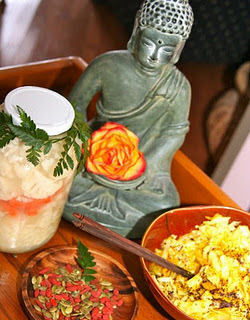
Suppose we look at food from a spiritual, truly holistic perspective. The ultimate goal of any dietary philosophy ought to be “to take us fully into the body, and beyond the body,” as degrowth activist Charles Eisenstein puts it (2).
By taking us fully into the body, our diet must allow us to experience vibrant health, the joy of intuitive eating, and of course the fulfillment of nutritional requirements.
By taking us beyond the body, our diet must serve to remind us that we are feeding more than just a body.
That nourishing the body well keeps it healthy, and also maintains it as a vehicle in the service of that higher power many of us know to be real, whether we call it the divine, nature, or God.
Many ancient traditions consider the body sacred, not because they view the body as God, but as a vehicle for God (2). Yogis and Taoists went to great measures to ensure the health and longevity of the body. Yogis developed an amazing system for maintaining and developing the body through diet (ayurveda), exercise, postures (yoga asana), herbal medicines, methods of breathing (pranayama), meditation and other lifestyle practices.
The Taoists also developed unique methods combining martial arts, visualisation, sound, subtle energy cultivation, energy manipulation (e.g. acupuncture), meditation, healing food and herbs. Despite such strong emphasis on health and longevity, both of these traditions understood that there is a deeper form of nourishment that sustains heart and soul.
The body is sacred, and therefore the nutrition of the body is also sacred. True nourishment grown, prepared and eaten consciously and respectfully, was believed to open the energy conduits of the body, helping the individual to be in service of the divine – whatever you perceive that to be.
In the west we have swapped this around – the body is emulated, manipulated, and morphed at a surface level, as a means to an end of creating a “good body”. Diets centered on making us feel good and look better sell the most books. The body is worshipped as if its perfection and health were the highest goal we could possibly attain.
The real "disconnect"
What is the price of this over-emphasis on the value of the body? Mass dissatisfaction with how we look, chronic dieting, and disordered eating. In Australia, 80% of women are dissatisfied with their bodies (2). A recent study that analysed more than 4000 children aged 8-9 and again at 10-11 discovered kids as young as eight had negative body image and by age 10 most children had tried to control their weight (3). That’s enough to make any parent concerned about their child’s self-esteem and psychological health.
Sadly, a woman’s own chronic dieting and disordered eating may immediately impact on her child’s relationship to food, not just during childhood but for the rest of his or her life.
“But I eat well to be healthy!” is what some readers may be thinking. Health is often necessitated as a practice in the name of maintaining or increasing attractiveness or fitness, and although there is nothing wrong with this, when such agendas are the sole goal of eating healthily it shortchanges the spiritual aspects of nutrition and self-care that were honoured by traditional cultures.
It makes an empty shell out of the rich and delightful experience of fully nourishing one’s body and spirit, and turns it into just another way to control an outcome – that outcome being the right body, the right look, the right amount of muscle tone, the right amount of “health”.
Without a spiritual foundation, nutritional knowledge can only go so far.
Most of us have plenty of nutritional knowledge, but fail to recognise that food and eating also carry a spiritual importance. When we allow food and life to be a form of nourishment instead of merely filling in the gaps of nutritional requirements, we feed not only our physical bodies but our spirits, too.
The famous mystic Ramakrishna reportedly said to one of his disciples, “if you spent one-tenth of the time you devote to distractions like chasing women or making money to spiritual practice, you would be enlightened in a few years!” (4).
I feel that if we spent one-tenth of the time we devote to thinking about what we should be eating, to understanding the sacredness of our meals, we may experience greater health than ever before.
References:
1. Tolle, E (2005). A New Earth - Awakening to Your Life’s Purpose
2. Eisenstein, C (2003). The Yoga of Eating - Transcending Diets and Dogma to Nourish the Natural Self
3. Ahern, JL & Diedrichs, PC (2010) Photoshopped perfection: The impact of airbrushed models in the media on young women's body image and advertisement effectiveness
4. Daraganova, G (2013). Body image of primary school children. Section of The Longitudinal Study of Australian Children Annual statistical report 2013, Australian Institute of Family Studies
5. Rinpoche, S (1992).The Tibetan Book of Living and Dying.

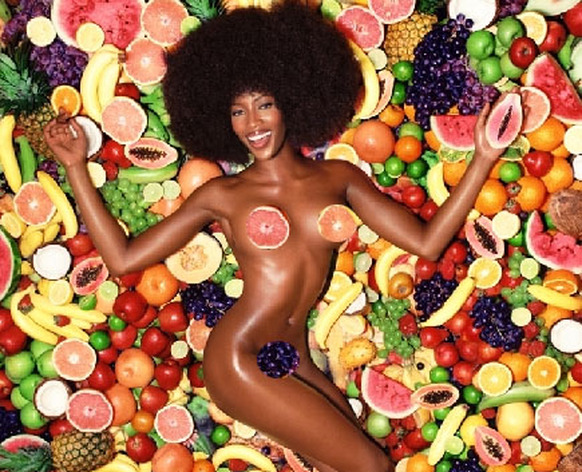
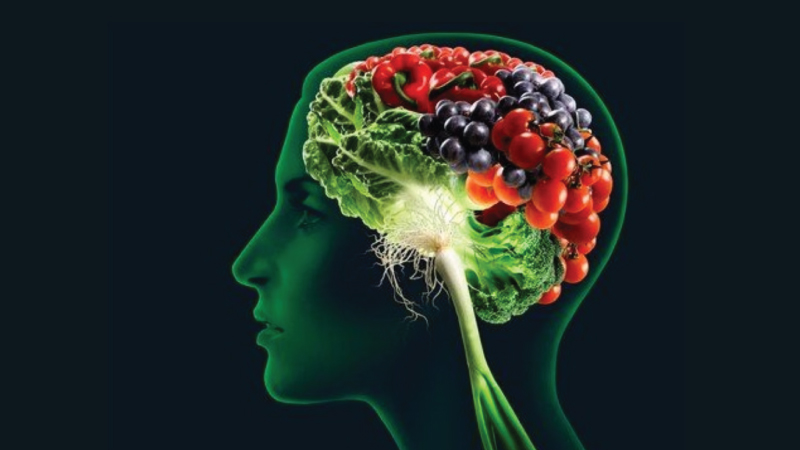



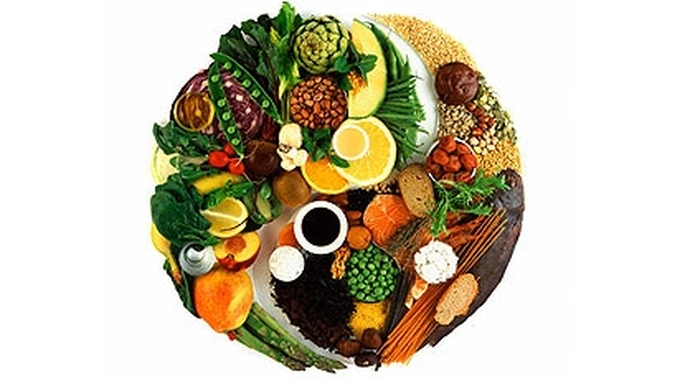
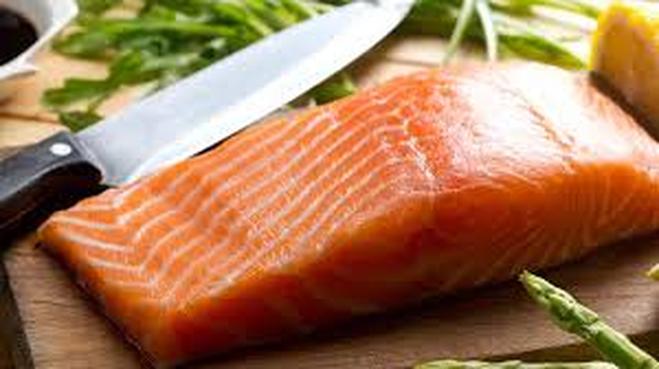
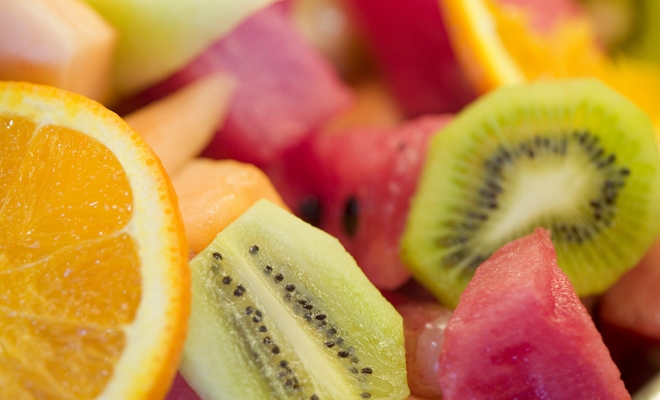

































 RSS Feed
RSS Feed



